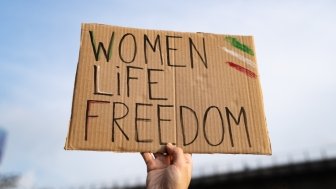Haleh Esfandiari
Distinguished Fellow; Director Emerita, Middle East Program
202/691-4259
Schedule an interviewExpert Bio
Dr. Haleh Esfandiari, the former and founding Director of the Middle East Program at the Woodrow Wilson International Center for Scholars, is a Public Policy Fellow at the Wilson Center. She has had a rich and varied career. In her native Iran, she was a journalist, served as deputy secretary general of the Women's Organization of Iran, and was the deputy director of a cultural foundation where she was responsible for the activities of several museums and art and cultural centers. She taught Persian language at Oxford University and, prior to coming to the Wilson Center, from 1980 to 1994, she taught Persian language, contemporary Persian literature, and courses on the women's movement in Iran at Princeton University. Dr. Esfandiari was a fellow at the Woodrow Wilson International Center for Scholars from 1995 to 1996.
Haleh Esfandiari is the author of My Prison, My Home: One Woman's Story of Captivity in Iran (September 2009), Reconstructed Lives: Women and Iran's Islamic Revolution (1997), editor of Iranian Women: Past, Present and Future (1977), co-author of Best Practices: Progressive Family Laws in Muslim Countries, the co-editor of The Economic Dimensions of Middle Eastern History (1990) and also of the of the multi-volume memoirs of the famed Iranian scholar, Ghassem Ghani.
Her articles have appeared in essay collections in a number of books as well as in Foreign Policy, Journal of Democracy, Princeton Papers in Near Eastern Studies, New Republic, Wilson Quarterly, Chronicle of Higher Education and Middle East Review. Her Op-Ed pieces include “Held in My Homeland” (September 2007), “Tehran's Self-Fulfilling Paranoia” (August 2009), and “My ‘Rosewater’: 105 dark days in an Iranian prison” (November 2014) in the Washington Post and "US Hikers and Iran's Maze" (October 2010) in the Los Angeles Times. She has also written for blogs and websites such as the New York Review of Books Blog with “Iran’s Harshest Sentence for an Innocent Scholar” (October 2009), “Iran’s Women of War” (January 2010), “Iran’s Interrupted Lives” (September 2010), “Iran’s State of Fear” (March 2011), “In the Jaws of the Mullahs” (November 2011), and “Iran’s Man in the Middle” (June 2013), as well as “Why Iran Freed Roxana Saberi” (May 2009) in the Daily Beast, “Misreading Tehran: The Real Impact of the Elections” (June 2010) in Foreign Policy, “Iran: The State of Fear” (April 2011) in the New York Review of Books, “The End of Illusion” in the blog of the New Republic (October 2011), “Understanding Iran’s Internal Divisions” (August 2014), “ISIS’s Cruelty Toward Women Gets Scant Attention” (September 2014), “Interpreting Iran’s Mixed Messages” (September 2014), “ISIS Says the Quran Allows Enslaving Women. Will Clerical Leaders Respond?” (October 2014), “What’s Behind the Hostility Toward Women in Iran” (October 2014), “How Iran Jails Journalists and Human Rights Lawyers” (November 2014), “Iran’s Nuclear Politics and Missed Opportunities” (November 2014), “Why the Media Should Not Forget Iran’s Detention of Jason Rezaian” (December 2014), “Iran’s Rouhani Pushes Back” (December 2014), “US-Iran Normalization? Don’t Hold Your Breath” (December 2014), “How Will Women in the Middle East Fare in 2015?” (January 2015), “Condemning Terrorism is Just a First Step for Muslim States” (January 2015), “The Significance of Hard-Liners’ Criticism of Iranian Foreign Minister Zarif” (February 2015), “From Khamenei, Conditions for a Deal on Iran’s Nuclear Program” (February 2015), “Have the Iran Nuclear Talks Reached an Impasse?” (February 2015), “In Bahrain, Arab Spring Hopes Are Freezing Over” (February 2015), “In Iran, a Range of Reactions to Netanyahu’s Speech and Nuclear Talks” (March 2015), “In Muslim Men’s Protests, Support for Women’s Choice About Veiling” (March 2015), “Will Museum Terrorist Attack Derail Tunisia’s Transition to Democracy?” (March 2015), “A Nuclear Deal Won’t Bridge the Divide Between Iran and the US” (March 2015), “As Iranians Welcome Nuclear Deal, Khamenei’s Reaction Is Key” (April 2015), “What Will, and Won’t, Help Free Jason Rezaian From Prison in Iran” (April 2015), “Iran Hard-Liners’ Newest Obsession: Cohabitation” (April 2015), and “A Warning in Iran’s Closed-Door Trial of Reporter Jason Rezaian” (May 2015) in blog of the Wall Street Journal, “Iran Curtails Female Education” in The Iran Primer blog (August 2012), “Breaking Taboos” in the Wilson Center’s Middle East Program’s Viewpoints series (November 2013), as well as pieces for the New York Times’ “Room for Debate” series (August 2013, March 2014, and August 2014). Dr. Esfandiari wrote the foreword to the monograph Iran’s Nuclear Chess: Calculating America’s Next Moves (July 2014) by Robert S. Litwak.
Haleh Esfandiari is the first recipient of a yearly award established in her name, the Haleh Esfandiari Award; this award was presented to her by a group of businesswomen and activists from countries across the Middle East and North Africa region on the occasion of a conference sponsored by the Wilson Center – Women Entrepreneurs: Business and Legal Reform in the MENA Region – held in Amman, Jordan in May 2008. Her other awards include: a John D. and Catherine T. MacArthur Foundation grant (1997); the Special American Red Cross Award (2008); the Women's Equality Award from the National Council of Women's Organizations (2008); and Miss Hall’s School Woman of Distinction Award (2009). In December 2008, she became one of three first annual recipients of the Project on Middle East Democracy’s “Leader for Democracy” award.
Dr. Esfandiari received her PhD. from the University of Vienna. She is a member of the Council on Foreign Relations. Dr. Esfandiari serves on the Board of the Peace Research Endowment and on the board of advisors for the Project on Middle East Democracy. She was featured in Parade magazine (May 2008), in O, the Oprah Winfrey magazine (November 2008), and in Vogue magazine (August 2009).
Her memoir, My Prison, My Home, based on Esfandiari’s arrest by the Iranian security authorities in 2007, after which she spent 105 days in solitary confinement in Tehran’s Evin Prison, was published in September 2009 by Ecco Press, an imprint of Harper Collins. The paperback edition was released in October 2010.
Education
PhD., University of Vienna
Honors
Recipient of a MacArthur Foundation Grant
Honorary degree from Georgetown University Law Center (2008)
Insight & Analysis by Haleh Esfandiari
- Blog post
- Women & Gender
Woman, Life, Freedom: The Second Anniversary

- Blog post
- Women & Gender
The Token Women in President Pezeshkian’s Cabinet
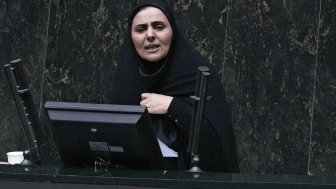
- Article
- International Security
Haleh Esfandiari on Iran’s New Cabinet: A Mixed Bag
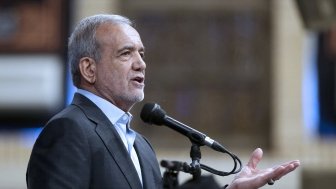
- Article
- Elections
Iran’s Surprising Election: Pezeshkian Beats the Odds
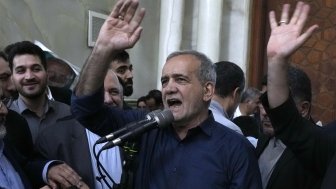
- Article
- Elections
Iran’s New Interim President
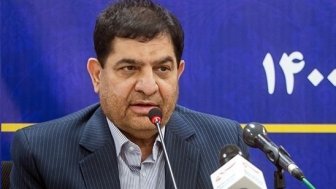
- Blog post
- Women & Gender
Iran’s Obsession with its Rebellious Youth
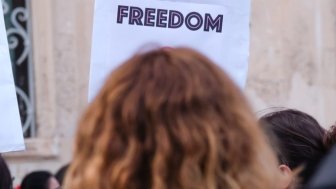
- Article
- Elections
Another Engineered Election in Iran

- Article
- Historical Memory
Iranian Women: From Enthusiasm to Rebellion
